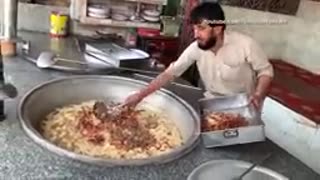Premium Only Content

Restaurants downplay failed inspections
In the restaurant industry, downplaying failed inspections is a concerning practice, as it can lead to serious food safety risks and health violations. When restaurants fail inspections, they might minimize or downplay the significance of the issues raised in order to avoid bad publicity, fines, or the potential closure of the establishment. This can be harmful in several ways:
### **Reasons Restaurants Downplay Failed Inspections:**
1. **Avoiding Negative Publicity:**
- Restaurants fear that a failed inspection could damage their reputation. They may downplay the findings to avoid a public perception of unsafe food or unhygienic conditions.
2. **Financial Concerns:**
- An inspection failure could result in costly fines, mandatory closures for cleaning or repairs, or even revocation of permits. To avoid these costs, some restaurants may minimize the importance of the failure.
3. **Fear of Losing Business:**
- A failed inspection, particularly if it is reported in local media or through online platforms (like review sites), can deter customers. Restaurants may downplay the severity of the issues to maintain customer trust.
4. **Pressure from Management or Ownership:**
- Managers or owners may be under pressure to meet financial goals, maintain high occupancy, or meet certain standards of cleanliness and service. This can lead to minimizing the severity of inspection findings to avoid consequences.
### **Risks of Downplaying Failed Inspections:**
1. **Health Hazards:**
- If a restaurant does not address food safety violations or improper hygiene, it can lead to foodborne illnesses, which can cause harm to customers and staff. Serious outbreaks can have long-term consequences, both for health and business.
2. **Legal Consequences:**
- Failing to address issues raised in an inspection can result in fines, closure orders, or even legal action if the restaurant is found to be in violation of health and safety regulations.
3. **Loss of Business:**
- Customers, especially those who prioritize food safety, may avoid restaurants with a history of inspection failures, leading to a long-term decline in sales. Negative reviews and social media comments can also contribute to this loss of business.
4. **Reputation Damage:**
- Word-of-mouth, media coverage, and online reviews can permanently damage the restaurant's reputation, leading to a decrease in customer trust. In some cases, it may be difficult for the restaurant to recover.
### **What Restaurants Should Do Instead:**
1. **Address Issues Promptly:**
- When a failed inspection occurs, it's essential for restaurants to address the issues immediately. Fixing problems quickly can help mitigate the potential consequences and restore customer confidence.
2. **Be Transparent:**
- Communicate openly with customers about inspection results and the steps being taken to improve. Transparency builds trust and shows a commitment to food safety.
3. **Invest in Ongoing Training:**
- Regular food safety and hygiene training for all staff members can help prevent violations from occurring. Training helps staff recognize and manage risks before they escalate.
4. **Use Inspections as Opportunities for Improvement:**
- Rather than downplaying the results, restaurants should use inspections as a chance to identify areas for improvement. Regular audits and internal checks can help maintain high standards and prevent failures.
5. **Correct and Document:**
- Ensure all violations are corrected, and keep a record of the steps taken to address them. This documentation can serve as proof of compliance in case of future inspections or audits.
### **How Consumers Can Stay Informed:**
- **Inspection Reports:** Many local health departments publish inspection reports online. Consumers can check these reports to understand a restaurant's history with food safety.
- **Reviewing Sources:** Consumers may also look at online review sites that mention cleanliness and food safety concerns.
### **Conclusion:**
While some restaurants may downplay failed inspections, the long-term consequences of ignoring or minimizing food safety concerns can outweigh the short-term benefits. Prioritizing safety, transparency, and continuous improvement can help restaurants maintain customer trust and avoid costly legal or health risks.
Would you like more detailed information on how health inspections work or how consumers can protect themselves when dining out?
-
 20:24
20:24
HSESafetyInformation
1 month agoKABULI PULAO RECIPE - Original 40+ KG Afghani Meat Pulau Prepared - Street Food Qabili Plav Recipe_2
27 -
 18:23
18:23
Michael Franzese
13 hours agoTom Hardy Is Back — And He’s Absolutely Ruthless | Mobland Review
47K8 -
 3:03:30
3:03:30
TimcastIRL
7 hours agoDemocrats Prep Trip To El Salvador To SAVE MS-13 Gang Member, Bring Terrorist To US | Timcast IRL
219K171 -
 2:30:28
2:30:28
Laura Loomer
9 hours agoEP114: Trump Cracks Down On Animal Testing
88.1K40 -
 2:08:29
2:08:29
RiftTV/Slightly Offensive
9 hours ago $25.58 earnedTexas MURDERER Karmelo Anthony Gets $800K House with GOFUNDME MONEY? | Slightly Offensive
67.6K44 -
 1:13:18
1:13:18
Glenn Greenwald
10 hours agoTrump Meets with El Salvador's Bukele: A Tyrant or a Model to Copy? Plus: Trump's Proposal to Deport Citizens There | SYSTEM UPDATE #439
127K183 -
 14:00:04
14:00:04
MDGgamin
16 hours ago🔴LIVE -TARKOV & Path Of Exile 2- Live Long Enough To Become The Villain. - #RumbleTakeover
30.6K1 -
 2:05:21
2:05:21
Joker Effect
6 hours agoRumble is all freedom of speech! @PlayMotherland and @IGGYAZALEA bring a great genre! The games are lit af!
42.8K1 -
 58:42
58:42
The Amber May Show
15 hours ago $8.92 earnedWomen Of Rumble 04-15-25
61.3K1 -
 4:49
4:49
The Official Steve Harvey
1 day agoSteve Harvey's Motivational Talks 💭✨ Dream Big, Work Hard, and Make It Happen! ✨💭
95.4K7